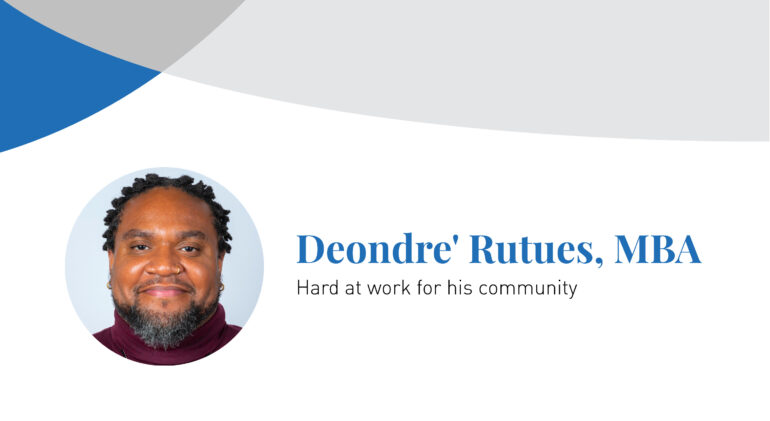“I have a lot of energy. I’ve always been young at heart, and I will forever be a student,” says Deondre’ Rutues, MBA, a Chicago Police District Councilmember in the 15th district and Ph.D. candidate in Business Psychology at The Chicago School. Rutues has accomplished much, but his greatest accomplishment is being a force of positivity in his community.
Rutues spent his early childhood on the far South Side of Chicago, 119th and Stewart, also known as the “Wild 100s,” before moving to and growing up in the city’s Austin neighborhood. He currently represents Austin as a councilmember.
“I’m a very proud Black man, and I know that my community will only be as good as the people who choose to intentionally give back,” Rutues says.
Rutues began pursuing his Ph.D. at The Chicago School in 2019. His dissertation is focused on psychological capital, meant to inform his community advocacy work with a deeper knowledge of psychology. He intends to be an authority figure for his community and responsible for enacting change.
In 2020, Rutues developed 40 Blocks & A Movement, a program through which he went door-to-door surveying more than 200 neighbors to learn more about vital neighborhood issues and gauge how connected his neighbors were to the community. From 40 Blocks & A Movement, Rutues created the Community Leadership Development Program with the help of The Chicago School to develop a network of leaders and inspire confidence within his community. Through the program, he translates the psychological vernacular of foundational knowledge from his education, such as conflict resolution and team building, into language and programming that his community can relate to.
For example, Rutues conducted a program meeting where, through thought-provoking conversations about community work and leadership, he helped his neighbors reconsider their own leadership role within their community, creating space for them to be emotionally vulnerable. Says Rutues, “I had an 80-year-old community member in the training, and he was like, ‘Oh, man, you’re opening me up like I’ve never been opened up before.’” Rutues encourages his fellow community members to dig into their emotional experiences and use them to their advantage. Through his programming, Rutues shows his neighbors and peers how a community is full of potential leaders and how anyone can enact change. His passion for this work is evident, and Rutues can name the particular source of that spark.
“Annie Jones, my angel, was that person in my life that led me down this path,” Rutues says. “I always say I would not be as community-oriented if the Jones family didn’t show me exactly what that means.”
A family friend who showed up when it mattered, Jones helped raise Rutues and his twin brother when they were young children. She was Rutues’ first exposure to how a community can embrace and uplift its own.
Throughout his life, Rutues often returned to Jones’ house to be fed knowledge since she had an abundance of it. “One of the things she always kept telling me was go get your lambskin [my diploma]. ‘Go get your lambskin!’ I always joke that the only thing she didn’t tell me is what to do once I got it.”
Thanks to Jones’ strong influence, Rutues was driven to become a positive force within his community. He pursued council work because he understands shaping policy can have a lasting impact on his community’s future.
For example, bridging the gap between the Chicago Police Department and his neighbors is Rutues’ current concern. It’s his responsibility to ensure both sides come to the table.
“I’m the community engagement specialist for the District Council, and my task is to build relationships between police, community organizations, and other stakeholders that need to be involved in the conversation.”
Rutues has two important initiatives for his council work. One is to insist on quicker police response times to calls from the Austin neighborhood. The second is to create policy around pretextual police stops, an issue commonly referred to as “driving while Black.”
Pretextual stops skyrocketed following the curtailing of stop-and-frisk procedures by the CPD. These stops allow police to pull motorists over for seemingly innocuous faults, such as a broken taillight, as a pretext to, for example, search a vehicle for contraband. A majority of pretextual stops turn up nothing, yet they occur in neighborhoods with primarily minority populations. Rutues intends to create policy to decrease the number of pretextual stops and implement programs to help community members better deal with police.
Rutues’ District Council work and community advocacy have been rigorously supported by the professors at The Chicago School, who attest to his prowess. His mentor, Sandra Seigel, Psy.D., of the Counseling Psychology Department, has been instrumental in supporting Rutues’ educational and political careers.
“Dr. Siegel introduced me to a brother by the name of Remel, a returning citizen.” As a formerly incarcerated person, Remel had relevant experience and perspective to be an integral part of his campaign team and strategize how to bridge the gap between the Chicago Police Department and the Austin community. “He could help us think about our strategic approaches and the messages we were crafting for our community.”
Beyond his council work, Rutues turns to his professors for accountability in both school and life. When he needs guidance, Rutues has many people to turn to, such as George W. Hay, Ph.D., of the Business Psychology Department.
“Dr. Hay has always been good to go and talk to when you need to sort things out and get your mind clear. He has that cool grandfather/uncle vibe where he keeps things light but real. He will tell you when you need to get on your business.”
Mutual generosity follows Rutues throughout his life. It’s clear he inspires others to be their highest selves and do work that matters.
When asked about his goals for his community, Rutues retains a simple and true vow: “I just want to show the community what can happen if we work together. That’s still the goal.”

